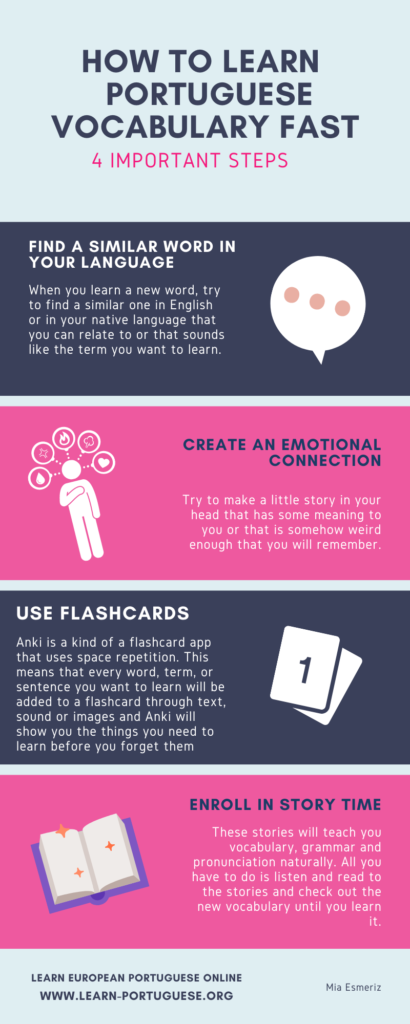In this post I will show you two ways that can help you learn Portuguese vocabulary fast and effectively. This means that you will be able to retain those words and likely not forget them ever again.
Sounds good? Then continue reading 🙂
But before I go onto the best technique you will learn to retain vocabulary, let me ask you:
Does learning vocabulary and actually remember it seem like a nightmare to you?
Do you get stuck when speaking Portuguese and have a hard time getting the right words out in a timely manner?
If you answered yes to any (or both) of the questions above, you are not alone!
Many people are struggling with the same thing.
Now, you might think it is because you are not a “language person” or because your memory is not working properly. Maybe you think you are too old to keep new words in.
Let me assure you, that is probably not the case!
First trick to learn Portuguese vocabulary fast
Let me tell you a story. Some years ago, I was trying to learn German and I found myself in the same situation. I wanted to know the words and use them at the right moment, but it was just too hard to keep up.
But one day, I found a solution that you can also start implementing from today!
Here is the trick:
1. When you learn a new word, try to find a similar one in English or in your native language that you can relate to or that sounds like the term you want to learn.
2. Then, try to make a little story in your head that has some meaning to you or that is somehow weird enough that you will remember.
Let me give you an example:
When I was trying to learn the word tisch in German, I thought of the word triste (sad) in Portuguese because they somehow sound similar.

Actually, when children start learning to speak here in Portugal, they will go through a phase when they cannot say the “r” (yes, did you think it was only you? 🙂 That IS a hard letter…). Then, if they want to say “I am sad” they will say Estou tishte.
Well, that sounds quite similar to the German word tisch (you can hear the sound by clicking the speakers on the links)!
So then I thought about a story that I could relate to these two words.
I thought that a sad little girl was sitting on the table because she did not want to eat her broccoli, so she says Estou tishte, while making a sad face.
Then, every time I wanted to remember the word tisch, all I had to do was recall this story in my head and because I made up this story, I could remember it really well! I thought of the table and I thought of what the child said, and I instantly remembered the word tisch.
Does this make sense to you?
Now sometimes you cannot find any words that match the word of your target language (the language you want to learn). Well, that is ok. What I normally do is try to deconstruct the word.
For example, in German a vacuum cleaner is a staubsauger.
Ok, so there is no word in Portuguese that can compare to this. So I break it down in parts: Sta-u-bsauger.
I pretend that Bsauger is the name of someone (weird, but it could be).
Then I go further and I elaborate on the story: Bsauger is a German guy that sells vacuum cleaners. I am in my room, and he arrives to the front door and he brings a vacuum cleaner in his hand because he wants to sell it. My friend sees him and then tells me Está o Bsauger à porta (Bsauger is at the door). Está o in Portuguese sounds a lot like Sta-u (the first part of the word in German). Both sound like “shta-u”.
Ok, so now I have thought of a story in my head and I can recall the word much easier in the future. Because I emotionally connected to that word through the bizarre story I created in my head.

Do you see the picture?
And this does not even take as long as you might think. Once you create that emotional response, your brain will be quick to catch up and bring those words to you. The more you do it, the quicker the response will be!
Remember: the key is consistency and once you have done this for a while, you will likely find it easier and easier every time you carry out this exercise.
The brain is like any other muscle and the more you train it, the fitter it will get!
How fun is this? Start today and tell me if this trick has helped you!
I would also like to tell you that I went ahead and I pre-made some stories for you, which will help you create the emotional connections you need with my brand new course – Story Time – Interactive Stories.
These stories will teach you vocabulary, grammar and pronunciation naturally. All you have to do is listen and read to the stories and check out the new vocabulary until you learn it.
If you want to, you can even take a step further and implement the exercise above into every word that you find difficult to learn and you will see that mixing the Story Time exercises with this trick will help you greatly and you will achieve fluency in no time!
Second trick to learn vocabulary effectively
Also, I would like to tell you about one of the best apps there is to help you learn new terms in any language – Anki.
Anki is a kind of a flashcard app that uses space repetition. This means that every word, term, or sentence you want to learn will be added to a flashcard through text, sound or images and Anki will show you the things you need to learn before you forget them.
You are the one who normally makes the flashcards and you also can choose whether you have already learnt a flashcard and when you want it to be shown to you again.
Like this, the words that you already know will be left aside and the ones you don’t know will be shown to you again when you are going through your flashcards once more.
If you are not keen on making your own flashcards, but you rather check out the ones that already exist, Anki offers a kind of a “public library” for decks that people already created and decided to share.
You actually can find a big array of topics, so feel free to explore for Portuguese and also anything else you are trying to learn and you need to store in your permanent memory. Anki will help you greatly!
It is really an interesting app, so go ahead, use and abuse it!
The desktop version is free, so if you have a computer you won’t have to pay anything. If, on the other hand, you only have a tablet or a phone, you will have to pay a fee per month – but I don’t think it is very high and a lot of people say it is really worth it for what you get.
But again, if you can, go for the free version 🙂
Conclusion
In conclusion, I would like to tell you not to give up. If you implement these two tricks (and some others that might also work for you and that you find along the way), you will be likely storing more and more vocabulary in your long-time memory.
The key is to create emotional connections with the words you are learning and to study them in a structured way.
I am going to let you go and start learning your vocabulary, but before I would like to propose some tasks.
| Your tasks for today: 1. Start implementing the first trick in all words that you find hard to remember. Be creative. Your brain loves creativity and you can imagine ANYTHING you want. The weirder the best because your brain will likely recall the story better. You can even write down your stories and come back to them later =) 2. Download Anki and see how it helps you with Story Time or with whatever course or exercise you are doing to learn vocabulary. I guess you are going to be pleasantly surprised! 🙂 |
And that’s it!
I hope you have enjoyed this article and that you are able to implement what you have learnt from today on.
Let me know in the comments below which of these two tricks you want to use and whether or not they are helping you 🙂
Beijinhos,
Mia.



Hey hi , Good Day!
I want to learn European Portuguese language, now I am staying in Singapore in future planning to mov Portugal. Can u send me good suggestion. Thanks
Hi Kishore 🙂
Thank you for your comment.
Feel free to check out my free webinar about How to learn Portuguese fast and effectively here:
https://event.webinarjam.com/register/32/x4ykwtmq
Let me know in case you have any questions.
Beijinhos,
Mia
very helpful..you are very dedicating to your work ….gbu nd stay safe…
Hi Kiran,
thank you for your comment 🙂
I am glad that you enjoyed the blog post.
Beijinhos,
Mia
EXCELLENT ARTICLE TO LEARN. YOU’RE AWESOME & BEST AS A TEACHER & FRIEND.
STAY HEALTHY, STAY SAFE.
THANKS A MILLION.
Thank you! Hope you are well.
Beijinhos,
Mia.